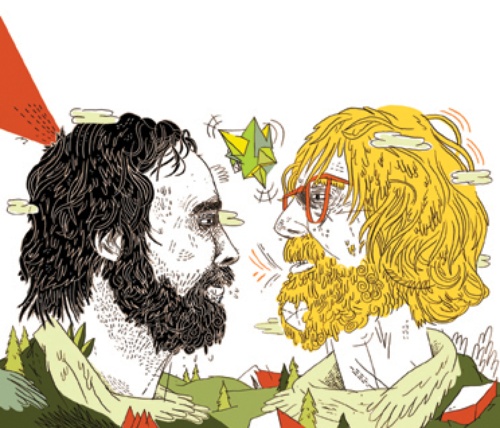
The Music We Hate: Broken Social Scene
"There is more to Toronto’s music than a mediocre band with one good album."
Illustration by Josh J. Holinaty
One night, soon after this essay appears, I will be walking the mean streets of Parkdale and a van will pull up, full of bearded musicians in plaid shirts. “We hear you don’t like Broken Social Scene,” they’ll growl, before they pull a hood over my head and coldcock me. If you are reading this, I want to be buried with my copy of Transformer on vinyl.
Broken Social Scene have gotten away with far too much, and produced far too little, to deserve their fame. The critical and commercial success of their 2002 sophomore album You Forgot It In People—which the band reportedly called “the cuddle after the cum shot”—should’ve spurred an indie gold-rush, in which the industry finally embraced all the tortured geniuses ignored while we were busy listening to Econoline Crush during the mid-nineties.
Instead Broken Social Scene’s swoony, multi-member sound—there are as many as nine musicans onstage at once—inspired copycats. Handclaps became the de facto percussion, and bands rushed to find their own slice of lush-banged eye candy struggling on keyboard. The group’s stranglehold on the Toronto scene tightened when they used their own label, Arts & Crafts, to sign lackluster side projects (Apostle Of Hustle, Stars) and obvious facsimiles (Most Serene Republic, Still Life Still). But for every new “musical collective” that succeeded in making group hugs listenable, lots more appalling imitators—believing more was more—jammed with eight violas, three trumpets and a tambourine.
Let me admit that You Forgot It In People was a true game-changer for Canadian music. The album was a heart-on-sleeve lament of scenester-spotting and bruised romanticism, replete with the rough-hewn acoustics of gurgling brass, sunny guitar, heady string sections and melodious lyricism. It was a breakthrough that appeared exactly when it was needed. Their highly-anticipated self-titled follow-up in 2005 was anything but: a drippy, cacophonous mess that name-checked friends (“Ibi Dreams of Pavement”) and featured singles as sexy as a limp dishrag (“Hotel”). Most unforgivably, there was a rap song with k-os. Throughout the mid-aughts Broken Social Scene became all about excess. There were too many guest stars, instruments and antics—a kitchen would burn down from all those cooks.
At the band’s height, Broken Social Scene t-shirts stretched across the heaving bosom of every young Sweaty Betty’s patron. One colleague paid her rent writing freelance pieces on the band’s various adventures. My college roommate listened exclusively to the Arts & Crafts label, and thus I suffered through “Mushaboom” on repeat as we scrubbed our toilet. They were everywhere, and threatened to fill the long years between albums with erratic, badly-recorded demos like Beehives. Thankfully the focus shifted to Montreal, where bands like Arcade Fire didn’t have to hide behind some reverb-y bullshit. They had captivating lyrics and interesting ideas. When Win Butler landed the cover of Spin next to Bruce Springsteen, I felt the Broken Social Scene curse had finally lifted.
This May, Broken Social Scene released their first album in four years, fittingly titled Forgiveness Rock Record. It is as incestuous, pillowy and shambolic as ever, featuring tracks like “Worldsick” and “Forced To Love” that reflect the band’s Fleetwood Mac-esque backstory of love affairs and ever-changing lineups. Perhaps the band’s apologetic purview comes from a Torontonian fear of being hated for their success. They want us to forgive because they know that we cannot forget the hackneyed philosophy, the engulfing hype. They’re right: there is more to Toronto’s music than a mediocre band with one good album.
Related on maisonneuve.org:
—The Music We Hate
—The Music We Hate: Online Supplement
—Born Here
Subscribe — Follow Maisy on Twitter — Like Maisy on Facebook





